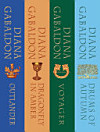Eric Brighteyes
พ.ย. 2022 · DigiCat
eBook
300
หน้า
family_home
มีสิทธิ์
info
reportคะแนนและรีวิวไม่ได้รับการตรวจสอบยืนยัน ดูข้อมูลเพิ่มเติม
เกี่ยวกับ eBook เล่มนี้
In "Eric Brighteyes," Henry Rider Haggard transports readers to a viking-inspired world where themes of honor, love, and the struggle for identity unfold. With a narrative steeped in adventure and rich with vivid descriptions, Haggard skillfully weaves Norse mythology into the fabric of his storytelling. The book is characterized by Haggard's signature prose, blending romanticism with a deep exploration of human emotions, which captivates the reader through its engaging plot and complex character dynamics. Set against a backdrop of fierce battles and mystical encounters, the novel reflects the Victorian fascination with ancient history and exotic cultures, inviting readers to explore the moral dilemmas faced by its hero, Eric Brighteyes. Haggard, an author known for pioneering the adventure genre, was deeply influenced by his experiences in colonial Africa and his extensive reading of Norse sagas. "Eric Brighteyes" draws on his fascination with mythology, demonstrating his ability to create compelling narratives that resonate with the struggle of the individual against societal expectations. Haggard's own life as an adventurer and a writer opened avenues for portraying the ancient world vividly and authentically. "Eric Brighteyes" is a must-read for fans of historical fiction and adventure tales alike, offering an immersive journey into a fantastical past that still speaks to contemporary issues of honor and personal courage. Haggard's masterful storytelling invites readers to reflect on the nature of heroism and the complexities of love, making this novel not only an engaging read but also a profound exploration of human experience.
เกี่ยวกับผู้แต่ง
Sir Henry Rider Haggard (1856–1925) was an English writer famed for his adventure novels set in exotic locales. His career blossomed with the release of 'King Solomon's Mines' (1885), a milestone in the lost-world genre that brought him great acclaim as a master of adventure literature. Haggard's writing was lauded not just for entertainment, but also for the depths of its character development, particularly evident in his much-admired creation, Allan Quatermain, the protagonist of 'King Solomon's Mines' and subsequent novels. In addition to his seminal Quatermain series, Haggard published 'Eric Brighteyes' (1891), an Icelandic-inspired saga that incorporates elements of Northern European myth and saga traditions, distinguishing his work with a rich vein of historical and cultural references. A notable novelist of the Victorian era, Haggard's work is characterized by vivid descriptions, heroic characters, and a style that captures the expansive spirit of the age of empire. His storytelling abilities are renowned for they often interweave romanticism with the burgeoning interest of the period in anthropology and archaeology. This unique blend contributed to the literary tapestry of his time, capturing the imaginations of readers hungry for escapism and adventure. Haggard was knighted in 1912 for services to the British Empire, underscoring not only the entertainment value of his work but also its cultural significance—reflecting and shaping contemporary attitudes toward colonial exploration.
ให้คะแนน eBook นี้
แสดงความเห็นของคุณให้เรารับรู้
ข้อมูลในการอ่าน
สมาร์ทโฟนและแท็บเล็ต
ติดตั้งแอป Google Play Books สำหรับ Android และ iPad/iPhone แอปจะซิงค์โดยอัตโนมัติกับบัญชีของคุณ และช่วยให้คุณอ่านแบบออนไลน์หรือออฟไลน์ได้ทุกที่
แล็ปท็อปและคอมพิวเตอร์
คุณฟังหนังสือเสียงที่ซื้อจาก Google Play โดยใช้เว็บเบราว์เซอร์ในคอมพิวเตอร์ได้
eReader และอุปกรณ์อื่นๆ
หากต้องการอ่านบนอุปกรณ์ e-ink เช่น Kobo eReader คุณจะต้องดาวน์โหลดและโอนไฟล์ไปยังอุปกรณ์ของคุณ โปรดทำตามวิธีการอย่างละเอียดในศูนย์ช่วยเหลือเพื่อโอนไฟล์ไปยัง eReader ที่รองรับ








